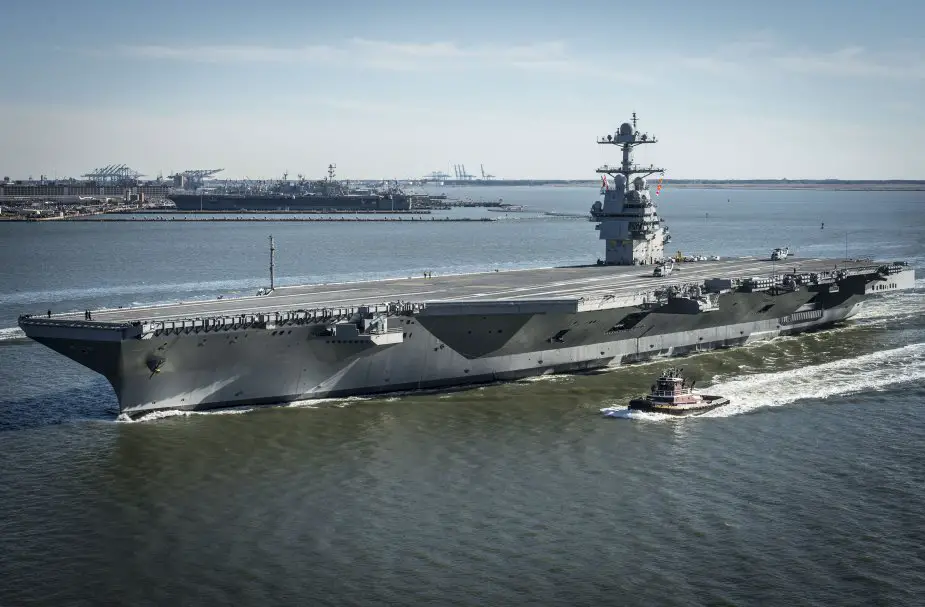Breaking news
Report to Congress on US Navy Gerald R. Ford Carrier Program.
This report provides background information and potential oversight issues for Congress on the Gerald R. Ford (CVN-78) class nuclear-powered aircraft carrier (CVN) aircraft carrier program. The Navy’s proposed FY2021 budget requests $2,714.2 million in procurement funding for the program. Congress’s decisions on the CVN-78 program could substantially affect Navy capabilities and funding requirements and the shipbuilding industrial base.
Follow Navy Recognition on Google News at this link
 USS Gerald R. Ford underway in April 2017 (Picture source: U.S. Navy photo by Mass Communication Specialist 2nd Class Ridge Leoni)
USS Gerald R. Ford underway in April 2017 (Picture source: U.S. Navy photo by Mass Communication Specialist 2nd Class Ridge Leoni)
From the report (summary)
The aircraft carriers CVN-78, CVN-79, CVN-80, and CVN-81 are the first four ships in the Navy’s new Gerald R. Ford (CVN-78) class of nuclear-powered aircraft carriers (CVNs). The Navy’s proposed FY2021 budget requests $2,714.1 million (i.e., about $2.7 billion) in procurement funding for CVN-78 class ships, including $71.0 million for CVN-78, $997.5 million for CVN-80, and $1,645.6 million for CVN-81.
CVN-78 (Gerald R. Ford) was procured in FY2008. The Navy’s proposed FY2021 budget estimates the ship’s procurement cost at $13,316.5 million (i.e., about $13.3 billion) in then-year dollars. The ship was commissioned into service on July 22, 2017. The Navy is currently working to complete construction, testing, and certification of the ship’s 11 weapons elevators and to correct other technical problems aboard the ship.
CVN-79 (John F. Kennedy) was procured in FY2013. The Navy’s proposed FY2021 budget estimates the ship’s procurement cost at $11,397.7 million (i.e., about $11.4 billion) in then-year dollars. The ship is being built with an improved process that incorporates lessons learned from the construction of CVN-78. CVN-79 is scheduled for delivery to the Navy in September 2024.
CVN-80 (Enterprise) was procured in FY2018. The Navy’s proposed FY2021 budget estimates the ship’s procurement cost at $12,321.3 million (i.e., about $12.3 billion) in then-year dollars. The ship is scheduled for delivery to the Navy in March 2028.
CVN-81 (Doris Miller) is treated in this report as a ship that was procured in FY2019, consistent with congressional action on the Navy’s FY2019 budget. The Navy’s FY2021 budget submission shows CVN-81 as a ship that was procured in FY2020. The Navy’s FY2021 budget submission estimates the ship’s procurement cost at $12,450.7 million (i.e., about $12.5 billion) in then-year dollars. The ship is scheduled for delivery to the Navy in February 2032.
CVN-80 and CVN-81 are being procured under a two-ship block buy contract that was authorized by Section 121(a)(2) of the John S. McCain National Defense Authorization Act for Fiscal Year 2019 (H.R. 5515/P.L. 115-232 of August 13, 2018). The use of the two-ship block buy contract reduced the combined estimated procurement cost of the two ships.
Oversight issues for Congress for the CVN-78 program include the following:
- The potential impact of the COVID-19 (coronavirus) situation on the execution of U.S. military shipbuilding programs, including the CVN-78 program;
- A delay in CVN-78’s first deployment due to the need to complete work on the ship’s weapons elevators and correct other technical problems aboard the ship;
- Whether the Navy in its FY2020 budget request has accurately priced the work on the CVN-78 program that it is proposing to fund in FY2021;
- Cost growth in the CVN-78 program, Navy efforts to stem that growth, and Navy efforts to manage costs so as to stay within the program’s cost caps;
- Additional CVN-78 program issues that were raised in a December 2019 report from the Department of Defense’s (DOD’s) Director of Operational Test and Evaluation (DOT&E) and a May 2019 Government Accountability Office (GAO) report on DOD weapon systems;
- Whether the aircraft carrier to be procured after CVN-81 should be a Ford-class carrier (i.e., a large-deck, nuclear-powered carrier) or a smaller and perhaps nonnuclear-powered aircraft carrier.




























